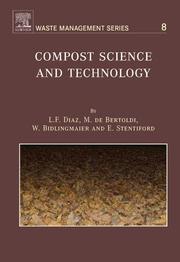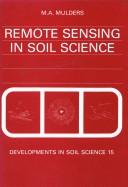| Listing 1 - 10 of 13 | << page >> |
Sort by
|
Book
ISBN: 1477717854 Year: 2014 Publisher: New York : Rosen Publishing,
Abstract | Keywords | Export | Availability | Bookmark
 Loading...
Loading...Choose an application
- Reference Manager
- EndNote
- RefWorks (Direct export to RefWorks)
Book
ISBN: 1003075827 100012519X 1000160017 1003075827 Year: 1995 Publisher: Oxon, UK : CRC Press, Taylor & Francis Group,
Abstract | Keywords | Export | Availability | Bookmark
 Loading...
Loading...Choose an application
- Reference Manager
- EndNote
- RefWorks (Direct export to RefWorks)
This book aims to aid decision-makers in planning, siting, designing, and operating composting facilities. It is also useful to citizens, regulators, consultants, and vendors interested in the composting of yard trimmings and municipal solid waste.
Book
ISBN: 0323918743 0323985041 9780323918749 9780323985048 Year: 2023 Publisher: Amsterdam, Netherlands ; Kidlington, Oxford, England ; Cambridge, Massachusetts : Elsevier,
Abstract | Keywords | Export | Availability | Bookmark
 Loading...
Loading...Choose an application
- Reference Manager
- EndNote
- RefWorks (Direct export to RefWorks)
Composting and vermicomposting are widely used biological processes for the management of the wastes produced by the communities and agricultural activities, which have experienced substantial growth during the last few years. Advances in Composting and Vermicomposting Technology summarizes the most important work conducted during the last few years under one cover.
Biotechnology. --- Compost. --- Vermicomposting.

ISBN: 9780080439600 0080439608 008054598X 9780080545981 9786611036782 6611036784 1281036781 Year: 2007 Publisher: Amsterdam ; Boston : Elsevier,
Abstract | Keywords | Export | Availability | Bookmark
 Loading...
Loading...Choose an application
- Reference Manager
- EndNote
- RefWorks (Direct export to RefWorks)
Composting is a widely used biological process for the management of some wastes produced in communities and agricultural activities, which have experienced substantial growth during the last few years. Because this and the knowledge of composting has increased, the number of composting facilities has increased tremendously, especially in some European countries. Interest has also increased in several countries in other regions of the world. This book attempts to summarize some of the most important work conducted during the last few years under one cover. The contributions to the publication
Compost plants. --- Compost. --- Environmental Sciences and Forestry. Soil Science
Book
Year: 2015 Publisher: Gabriola Island, British Columbia : New Society Publishers,
Abstract | Keywords | Export | Availability | Bookmark
 Loading...
Loading...Choose an application
- Reference Manager
- EndNote
- RefWorks (Direct export to RefWorks)
Reduce the environmental paw print of your furry friend.
Animal waste --- Compost. --- Pet cleanup. --- Recycling.

ISBN: 9780080439600 0080439608 9786611036782 1281036781 008054598X 9780080545981 6611036784 Year: 2007 Publisher: Amsterdam ; Boston : Elsevier,
Abstract | Keywords | Export | Availability | Bookmark
 Loading...
Loading...Choose an application
- Reference Manager
- EndNote
- RefWorks (Direct export to RefWorks)
Composting is a widely used biological process for the management of some wastes produced in communities and agricultural activities, which have experienced substantial growth during the last few years. Because this and the knowledge of composting has increased, the number of composting facilities has increased tremendously, especially in some European countries. Interest has also increased in several countries in other regions of the world. This book attempts to summarize some of the most important work conducted during the last few years under one cover. The contributions to the publication
Compost plants. --- Compost. --- Environmental Sciences and Forestry. Soil Science --- Plants, Compost --- Factories --- Refuse disposal facilities --- Indore process --- Organic fertilizers --- Organic wastes --- Soil amendments --- Humus --- Vermicomposting
Periodical
Abstract | Keywords | Export | Availability | Bookmark
 Loading...
Loading...Choose an application
- Reference Manager
- EndNote
- RefWorks (Direct export to RefWorks)
Organic wastes --- Compost --- Conservation of Natural Resources. --- Ecology. --- Recyclage (Déchets, etc.) --- Recycling
Book
ISBN: 0323856020 0323856039 9780323856034 9780323856027 Year: 2022 Publisher: London : Elsevier Inc.,
Abstract | Keywords | Export | Availability | Bookmark
 Loading...
Loading...Choose an application
- Reference Manager
- EndNote
- RefWorks (Direct export to RefWorks)
The Composting Handbook provides a single guide to the science, principles and best practices of composting for large-scale composting operations facing a variety of opportunities and challenges converting raw organic materials into a useful and marketable product. Composting is a well-established and increasingly important method to recycle and add value to organic by-products. Many, if not most, of the materials composting treats are discarded materials that would otherwise place a burden on communities, industries, farms and the environment. Composting converts these materials into a valuable material, compost, that regenerates soils improving soils for plant growth and environmental conservation. The Composting Handbook expands on previously available resources by incorporating new information, new subjects and new practices, drawing its content from current scientific principles, research, engineering and industry experience. In both depth and breadth, it covers the knowledge that a compost producer needs to succeed. Topics include the composting process, methods of composting, equipment, site requirements, environmental issues and impacts, business knowledge, safety, and the qualities, uses and markets for the compost products.
Compost --- Indore process --- Organic fertilizers --- Organic wastes --- Soil amendments --- Humus --- Vermicomposting --- Compost. --- Agronomy. --- Agriculture. --- Farming --- Husbandry --- Industrial arts --- Life sciences --- Food supply --- Land use, Rural --- Agriculture --- Crops --- Soil management

ISBN: 0444989366 9786611985141 1281985147 0080869858 9780080869858 9780444989369 0444408827 4762205346 0444416684 9780444408822 9780444416681 Year: 1987 Volume: 17 Publisher: Tokyo : Amsterdam ; New York : Japan Scientific Societies Press ; Elsevier,
Abstract | Keywords | Export | Availability | Bookmark
 Loading...
Loading...Choose an application
- Reference Manager
- EndNote
- RefWorks (Direct export to RefWorks)
Despite the large number of papers and books published on soil organic matter (humus), our knowledge of the subject is still very limited, as is our knowledge of humic acid. The author of this book began to study humus at the end of the 1940s and continued until 1984 when he retired from Nagoya University. With the intention of establishing a systematic understanding of soil organic matter, he has compiled facts and a discussion of humus based on his extensive experimental results during the past 40 years.In this book, humic acids are classified into A, B, Rp and P types, based on th
Humus --- Humic acid --- Acides humiques --- Humus. --- Soils --- Mold, Vegetable --- Mould, Vegetable --- Muck --- Organic matter in soil --- Soil organic matter --- Vegetable mold --- Histosols --- Organic fertilizers --- Compost --- Plant litter --- Humic acid content. --- Organic matter --- Composition --- Soil chemistry
Periodical
ISSN: 02375419 20631588 Year: 1956 Publisher: Budapest : Dept. of Systematic Zoology & Ecology, Eötvös Loránd University
Abstract | Keywords | Export | Availability | Bookmark
 Loading...
Loading...Choose an application
- Reference Manager
- EndNote
- RefWorks (Direct export to RefWorks)
Zoology --- Aquatic biology --- Soil animals --- Zoologie --- Hydrobiologie --- Faune du sol --- Periodicals. --- Periodicals --- Périodiques --- Internet resources. --- Electronic journals. --- Aquatic biology. --- Soil animals. --- Zoology. --- Périodiques --- DOAJ-E EJBIOLO EPUB-ALPHA-O EPUB-PER-FT --- taxonomy --- ecology --- soil zoology --- hydrobiology --- Biology --- Natural history --- Animals --- Soil fauna --- Soil biology --- Compost animals --- Hydrobiology --- Water biology --- Aquatic sciences --- General ecology and biosociology
| Listing 1 - 10 of 13 | << page >> |
Sort by
|

 Search
Search Feedback
Feedback About UniCat
About UniCat  Help
Help News
News